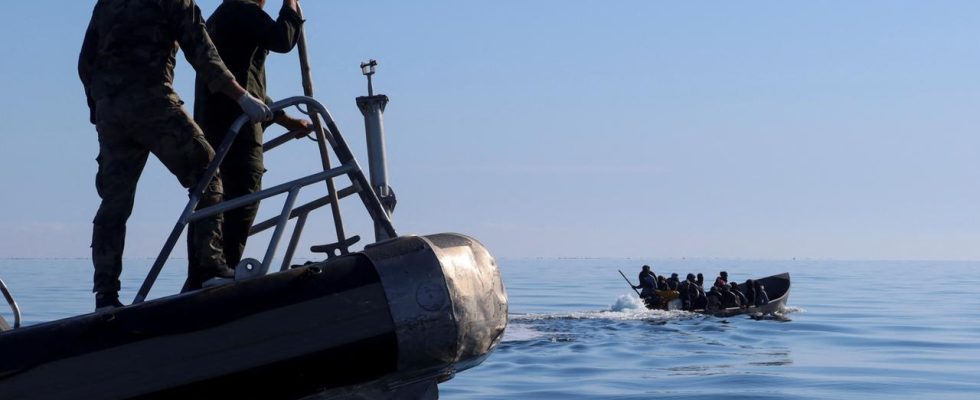First an EU delegation, then Federal Interior Minister Faeser: Tunisia is experiencing a lot of travel diplomacy, even if the president is governing increasingly autocratically. Has Europe come closer to limiting migration?
Ameni Ochbati wants to fulfill her dream and start a new life – far away from her home country Tunisia, in Germany. The 24-year-old has a high school diploma and a Tunisian education as a Logistics technician. Now she has applied for an apprenticeship in Germany via a German labor migration program.
The interview for that is in two days. “If it works, I can start in Germany in September.” Ochbati speaks German so well that she can chat with Interior Minister Nancy Faeser about her plans.
Faeser wants labor migration facilitate
Facilitating labor migration is one of Faeser’s missions during the short visit to Tunis. Project manager Stephanie Schrade reports that the German Society for International Cooperation (GIZ) has already placed 200 trainees in Germany this year, plus 70 specialists.
18,500 Tunisians came to Italy in 2022
But are such projects really deterring young Tunisians, frustrated by their country’s miserable economic situation, from embarking on the high-risk journey across the Mediterranean? Those who have no chance of one of the few places in a German-Tunisian job market project?
3,200 Tunisians arrived in Italy by April this year, according to UNHCR, about 18,500 in all of 2022. It is questionable whether money and good words from the EU can stop these people. Especially since the young Tunisians who make it to Europe in tugboats and – if they’re lucky – find work there, transfer large parts of their money home.
willingness to cooperate against money
According to the Tunisian central bank, around 2.5 billion euros flowed from Tunisians abroad to Tunisian accounts last year. In the current economic crisis, these remittances have become a key survival strategy for Tunisian families, according to Isabelle Werenfels, Maghreb expert at the Science and Politics Foundation, on Deutschlandfunk.
“There is not a great deal of will among the population to put the brakes on that. With the President, you have to say that the will to cooperate is there to a certain extent: to prevent more people from leaving,” says Werenfels. But this is subject to conditions. “And the condition is primarily that you get money.”
controversial negotiating partner
The fact that “we are negotiating with the president who has systematically dismantled Tunisia’s democratic structures over the past two years” has been completely neglected.
It is unclear whether these sensitive issues, President Kais Saied’s style of government and his speech in February against immigrants from sub-Saharan Africa were discussed at the negotiating table. Faeser reports that she “raised very strongly” about human rights.
How is the repatriation going?
Even after Faeser’s visit, it remains unclear how the issue of returning migrants will continue. It will be difficult for the EU to return people to Tunisia whose homeland is in other countries, south of the Sahara for example.
This is probably what the president was aiming for in his only resumé of the meeting with Faeser that was released for publication: “Tunisia can only protect its own borders. And we will not accept becoming an immigration country.”
Repatriations of Tunisians work “not bad”
And what about the Tunisians who could be deported from the EU? In practice, at least, there do not seem to be any insurmountable problems. A total of 1,383 Tunisian citizens applied for asylum in Germany last year, and by May of this year there were already 1,095.
Tunisians do not have much of a chance of asylum or similar protection in Germany. This year, only 1.5 percent of applicants received a positive decision. According to the Federal Ministry of the Interior, almost 200 Tunisians were deported from Germany in 2022. Before the corona pandemic, there were more.
After the assassination of Tunisian Anis Amri at the Berlin Christmas market, Chancellor Angela Merkel pushed for cooperation with Tunisia on deportations. Maghreb expert Werenfels explains: “The repatriation of Tunisians isn’t going so badly. If you look at it in Germany, there are charter flights back. That’s less of a problem, because Tunisia is also cooperating.”
No transit camps in Tunisia?
So what have the current diplomatic offensives achieved in Tunis? Johannes Kadura from the Friedrich-Ebert-Foundation in Tunis draws a mixed balance. On the one hand, Tunisia has now landed on the Europeans’ list of priorities and at the negotiating table. However, it is questionable whether the visits will bring the hoped-for results.
After all, Saied has repeatedly stated that his country only monitors its own national borders and does not want to take in migrants from other nations. “In doing so, he rules out transit camps in Tunisia, at least in his official rhetoric,” says Kadura. Tunisia also has borders that are very difficult to control.
So many open questions remain. This is also the résumé of the German interior minister: Work structures have now been created on which one can build. Apparently, a migration agreement is still a long way off.

